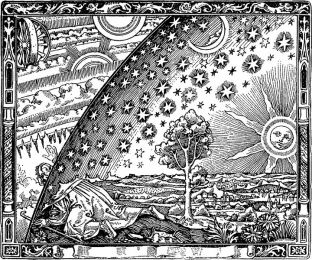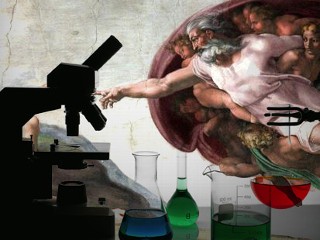 It's difficult to think of any piece of literature as supportive of the modern scientific enterprise as Genesis 1. All the necessary foundations are in place:
It's difficult to think of any piece of literature as supportive of the modern scientific enterprise as Genesis 1. All the necessary foundations are in place:
1. Laws Up Above
The ancient Chinese had incredible technology but not science as we know it. Why? Because however great their minds were, they didn't conceive of the world operating similarly according to a Great Mind. They didn't think there were ever-present, always-applicable laws of nature that governed the universe. They went out into the world and tamed it through technology but they didn't seek to press into the deeper laws of the universe.
That's because they didn't have Genesis 1. They didn't believe that "In the beginning God" and that through his word an ordered cosmos is created which shows all the hallmarks of dependable regularities - seasons and spheres with boundaries and signs in the heavens, all going round and round - evening and morning, evening and morning.The God of Genesis 1 is a God prior to nature and beyond nature, therefore He gives us every reason to expect laws of nature. This is absolutely vital if you want to do science.
It's not uncommon to find scientists today expressing their doubts that a "Grand Unified Theory" of everything may be found. That's quite consistent. To believe in a grand unified theory sounds remarkably like Genesis 1, and who believes that anymore? But actually it's belief in the God of Genesis 1 that will engage you further with the scientific enterprise. Disbelief will make you give up the investigation prematurely.
2. A World Out There
The ancient Greeks were smart cookies. All philosophy is footnotes to Plato and all that. Philosophy, mathematics, art and literature were all spheres of excellence for the Greeks. Science? Not so much. Because science requires you to believe in a stable and predictable world out there that is open to investigation. Science occurs when you make repeatable observations and check your theories against the cold hard facts. But Greeks didn't believe in cold, hard facts. They believed in minds and reason and laws but not in empirical investigation. To study something for the Greeks meant a journey within the mind - not a venture out into the field. And so, no science.
But in Genesis 1 you have a genuinely concrete, genuinely real world. It's not this second-class excretion from the gods, it's positively willed by God, different to God (contingent not necessary) yet at the same time declared very good. It's the kind of place you can move out into and have dominion over. It is open to us. In fact we are told to fill it, order it, develop it. Science is not just enabled by Genesis 1, it's virtually commanded.
3. Minds In Here
If human minds are the product of mindless operations which only honour survival, not intelligence (the two are not at all synonymous), then why should we trust our minds to understand the laws up above and the world out there. If we are a part of the cosmos thrown up by the cosmos with no higher calling than to pass on our genes then why trust a brain that whirs away according to its own survival imperative?
If you really want to have confidence in scientific endeavour then turn to Genesis 1 where humanity are specially created in certain relationships with the Orderer above and the world out there. The image of God is on us and the command of God is to rule and fill the world. More than this, if humanity is created in God's image it is because we are destined in Christ (the Image) for face-to-face fellowship with God. If that is so then we can have every confidence that the human mind is indeed capable of grasping those things above, even as we are sent into the world out there.
Genesis 1 is very far from being anti-science. It gives us these three building blocks and every reason to believe that they will triangulate to yield fresh insights. If we turn from the Bible, what right do we have to expect rational order to the cosmos? What right do we have to expect a comprehensible universe? What right do we have to privilege the processes of these 3 pound blobs of grey matter between our ears? Actually, to turn from the Scriptures is to weaken science, not strengthen it.
The realities spoken of in Genesis 1 provide the scientific enterprise with its firmest possible foundations.














 Brian Cox wants the Large Hadron Collider to show him 'the face of the cosmos'. But if that's what you want, there's a much better scientific method...
Brian Cox wants the Large Hadron Collider to show him 'the face of the cosmos'. But if that's what you want, there's a much better scientific method...